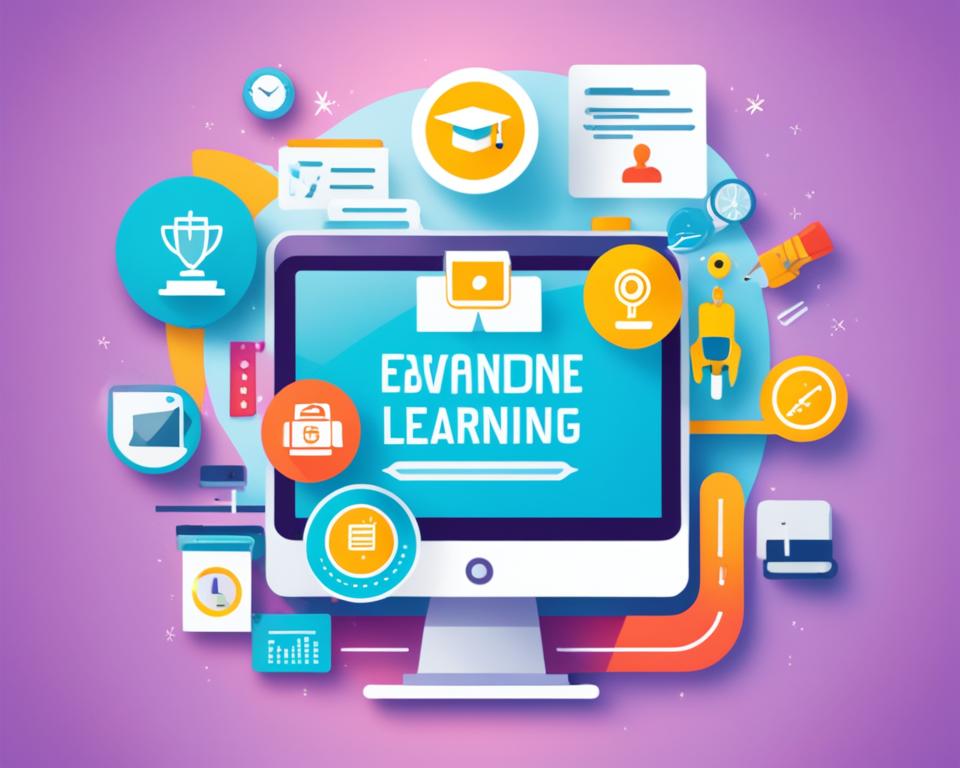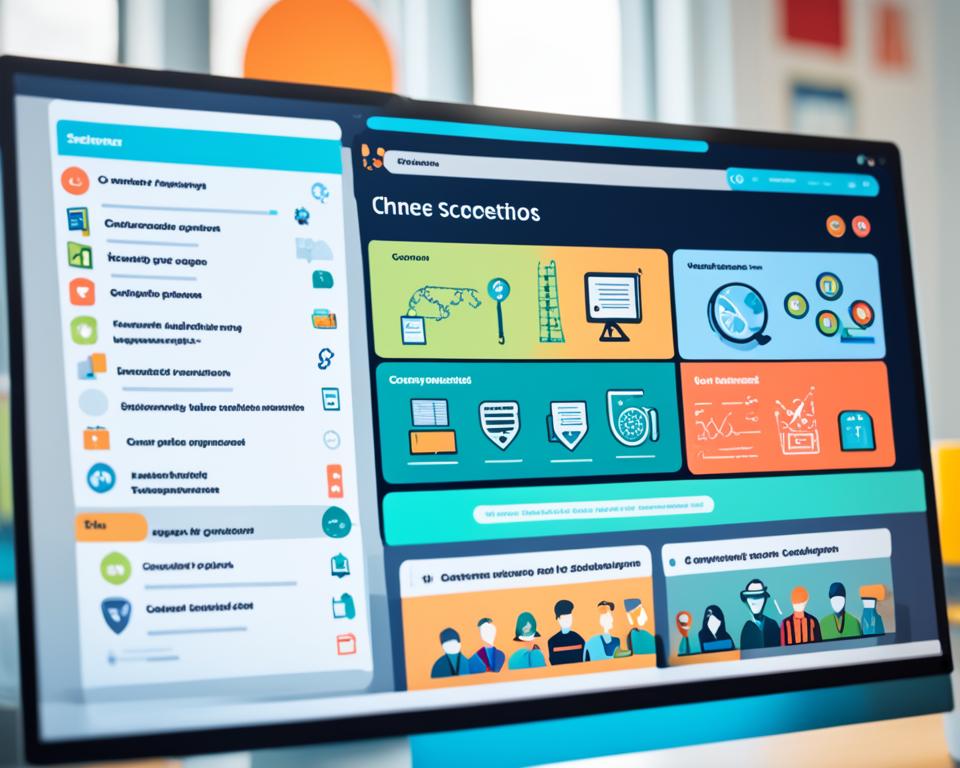Interest and participation in online learning continues to grow. In 2020, there was a record enrollment in online courses, and universities have launched new online programs to meet the increased demand. This has led to increased competition among online education providers. Four core market forces are reshaping the online education space: increased competition, consolidation by big players, influx of investments, and rising standards for quality.
Key Takeaways:
- Online learning is experiencing significant growth with a surge in enrollment and the launch of new programs.
- Competition among online education providers is increasing due to market forces.
- Consolidation by major players, influx of investments, and rising quality standards are shaping the online education landscape.
The Growing Demand for Online Education
The demand for online education has skyrocketed in recent years, driven by various factors such as the accessibility of virtual classes, the availability of e-learning options, and the flexibility of study options. The proliferation of massive open online courses (MOOCs) has considerably expanded the number of learners reached, offering a wide range of courses and subjects to cater to diverse interests.
Moreover, the COVID-19 pandemic has accelerated the growth of online education, particularly in traditional universities. As institutions shifted to hybrid and distance-only learning models, both the number of hybrid students and those pursuing entirely online degrees surged. This shift in educational dynamics has further fueled the demand for online education and forced universities to adapt to the changing landscape.
While online degree-granting universities have experienced significant growth in enrollment, they face fierce competition from digital-native entrants disrupting the space. These digital-native platforms often offer innovative e-learning options, leveraging cutting-edge technologies to deliver dynamic and interactive learning experiences.
The primary drivers behind the growing demand for online education are the need to acquire high-demand skills and the desire for career advancement. Online education provides individuals with the opportunity to acquire in-demand skills, such as coding, digital marketing, and data analysis, which are crucial in today’s job market. Additionally, online education offers the flexibility required by working professionals to balance their studies with their existing commitments, making it an attractive option for career-driven individuals.
“Online education has emerged as a game-changer, offering flexible study options for individuals seeking career advancement.”
The image below illustrates the soaring popularity of online education:
| Year | Number of Online Learners |
|---|---|
| 2015 | 10 million |
| 2017 | 20 million |
| 2019 | 40 million |
| 2021 | 70 million* |
As illustrated in the table above, the number of online learners has steadily increased over the years, reflecting the growing demand for online education. It is projected that the demand will continue to rise, with an estimated 70 million online learners in 2021.
Overall, the growing demand for online education can be attributed to the accessibility, flexibility, and career advancement opportunities it offers. As the educational landscape continues to evolve, online education remains a viable and convenient option for individuals seeking to enhance their skills and achieve their career goals.
The Challenges Faced by Online Education Providers
Despite the growing demand for online education, providers in this space encounter several challenges in creating compelling offerings that appeal to prospective students. With the market becoming increasingly competitive, online education providers need to go beyond incremental improvements to survive and grow. New entrants are disrupting the market, backed by venture capital funding, intensifying the competition. Additionally, ensuring the quality of online education remains a concern as the lines between degree and nondegree learning become blurred.
“The online education market is expanding rapidly, and providers must continuously innovate to remain competitive.”
One of the challenges faced in the online education landscape is the need for differentiation. As more providers enter the market, it becomes crucial for online education providers to create unique and engaging web-based courses and internet-based learning experiences that set them apart from the competition.
“To thrive in the online education space, providers must navigate through a rapidly changing landscape driven by technological advancements and evolving student expectations.”
Another significant challenge lies in maintaining the quality of online education. As the demand for online education grows, providers must ensure that the courses and programs offered meet high standards of instruction and provide valuable learning outcomes for students.
“In an increasingly digital world, online education providers must continually assess and improve the quality of their programs to meet the evolving needs of learners.”
Furthermore, the merging of traditional education with online learning platforms presents both opportunities and challenges. With the blurring lines between degree and nondegree programs, providers must find innovative ways to offer relevant and industry-aligned courses that cater to different educational aspirations and career goals.
“Online education providers must strike a balance between offering flexible learning options and maintaining the credibility and value of their programs.”
To thrive in this competitive environment, online education providers must be agile, adaptable, and proactive in addressing these challenges. They should focus on continuous improvement, enhancing the learning experience, and providing programs that meet the demands of today’s learners.
Challenges Faced by Online Education Providers
| Challenge | Description |
|---|---|
| Intense Competition | The online education market is becoming increasingly competitive, requiring providers to differentiate themselves from others. |
| Ensuring Quality | Providers must uphold the standard and value of online education by maintaining the quality of their programs. |
| Blurring Lines Between Degree and Nondegree Learning | The merging of traditional and online education presents challenges in offering relevant and industry-aligned programs that cater to diverse educational goals. |
Strategic Moves to Unlock Opportunities in Online Education
To unlock growth opportunities and stay competitive in the ever-evolving online education landscape, providers must be willing to adapt and make bold moves. Here are five strategic approaches that can help online education providers meet the needs of both students and the labor market:
1. Integrating Skill Building and Degree Attainment
Online education providers should offer programs that go beyond traditional degree attainment. By integrating skill-building opportunities within their curriculum, students can acquire the practical knowledge and expertise required in today’s job market. This approach allows them to graduate with not only a degree but also valuable skills that enhance their employability.
2. Transforming Career Planning and Coaching Services
Helping students navigate their career paths is essential for online education providers. By offering comprehensive career planning and coaching services, providers can assist students in identifying their goals, creating personalized career development plans, and acquiring the necessary skills and knowledge to achieve their aspirations. This tailored guidance helps students make informed decisions and maximize their career potential.
3. Revolutionizing Employer Relationships
Establishing strong connections with employers is crucial to ensure that online education programs align with the demands of the job market. By fostering partnerships and collaborations, online education providers can gain insights into industry trends and specific skill requirements. This information can inform curriculum development, ensuring that graduates are equipped with the skills and knowledge sought by employers.
4. Delivering a Distinctive Learning Experience
Creating a unique and engaging learning experience sets online education providers apart from their competitors. By leveraging innovative technologies and pedagogical approaches, providers can offer interactive and immersive learning environments. Virtual classrooms, collaborative projects, and interactive simulations enhance student engagement and foster a deeper understanding of the subject matter.

5. Building a Bold and Distinctive Brand
A strong brand identity is key to attracting prospective students and differentiating from other online education providers. This involves crafting a compelling message that highlights the institution’s unique value proposition, mission, and commitment to student success. By building a bold and distinctive brand, online education providers can effectively communicate their strengths and attract a wider audience.
Implementing these strategic moves helps online education providers adapt to changing market needs, stand out from the competition, and ultimately unlock growth opportunities. By continually innovating and meeting the evolving demands of students and the labor market, online education providers can position themselves for long-term success in the dynamic world of online learning.
Aligning Programs with Market Needs
Educational institutions must strive to align their programs with the evolving needs of the market. In today’s rapidly changing landscape, traditional program development processes may fall short in equipping graduates with the required skills and agility to meet current industry demands. To bridge this gap, institutions should adopt an iterative “learn and design” program creation process that takes into account industry trends, shifts in skills demand, and the rapid development of new programs.
By staying abreast of industry trends and technological advancements, institutions can develop programs that equip students with the technical and nontechnical skills necessary for success in the modern workforce. This proactive approach enables educational institutions to anticipate industry needs and provide students with the knowledge and competencies that will make them stand out in the job market.
Integrating Degree and Nondegree Offerings
Moreover, educational institutions can enhance the educational experience by integrating degree and nondegree offerings. This approach goes beyond traditional degree programs and provides students with a more comprehensive education that aligns with their career goals and aspirations.
Integrating degree and nondegree offerings allows students to develop a diverse skill set and pursue specialized areas of interest. For example, a computer science student may have the option to complement their degree with short-term certifications in emerging technologies such as data analytics or cybersecurity. This flexibility and customization empower students to tailor their education to their specific career objectives, increasing their marketability and employment prospects.
| Benefits of Integrating Degree and Nondegree Offerings |
|---|
| 1. Enhanced flexibility and customization |
| 2. Increased marketability and employment prospects |
| 3. Opportunities to acquire niche skills |
| 4. Staying ahead of industry trends |
Industry-Relevant Programs in Action
“At the XYZ University, we understand the importance of aligning our programs with industry needs. With the expertise of industry professionals and ongoing market research, we continuously update our curriculum to equip our students with the skills and knowledge that ensure their success in the competitive job market. Through our integrated degree and nondegree offerings, our graduates emerge as highly desirable candidates with a diverse skill set and a deep understanding of industry trends.”
– Jane Smith, Dean of the School of Business, XYZ University
By aligning programs with market needs and offering integrated degree and nondegree options, educational institutions can provide students with a comprehensive and relevant education that prepares them for the evolving job market. This strategic approach not only benefits students but also helps institutions stay competitive and maintain their position as leaders in the field of education.
Connecting Programs to Career Goals
When it comes to online education programs, career goals play a significant role in motivating students to enroll. As a provider, it’s crucial to establish a strong connection between your programs and the career outcomes that students aspire to achieve. By emphasizing the value of acquiring high-demand skills, you can attract prospective students who prioritize career advancement over institutional brand.
Today’s students are increasingly interested in programs that offer expected positive returns on their career outcomes. They want to see tangible results and know that investing their time and energy will lead to an enhanced professional trajectory. By showcasing the success stories of previous graduates who have achieved significant career milestones, you can provide reassurance and inspire confidence in the prospective students.
One effective strategy is to offer cost-effective options beyond traditional degree programs. Many students are seeking flexible learning opportunities that allow them to acquire industry-specific skills without committing to a full degree. Nondegree learning opportunities, such as specialized certifications or short-term courses, can provide a targeted approach to skill-building that aligns with specific career goals.
By connecting your programs to career goals and highlighting the potential return on investment, you can position your institution as a pathway to success in the professional world. Let’s take a closer look at how focusing on career outcomes, high-demand skills, and return on investment can attract motivated students and provide them with the tools they need to thrive.
Highlighting Career Outcomes
When marketing your online programs, it’s essential to showcase the career outcomes that students can expect upon completion. Highlight success stories of graduates who have secured rewarding positions in their desired fields as a result of their education. These stories can inspire prospective students and demonstrate the positive impact your programs can have.
Consider developing a testimonial section on your website or creating video content featuring alumni sharing their success stories. This not only adds credibility to your programs but also helps students envision themselves achieving their own career goals through your institution.
Emphasizing High-Demand Skills
In today’s dynamic job market, high-demand skills are essential for career growth and success. When promoting your online programs, focus on the specific skills that are in high demand within the industries your students aspire to enter.
Highlight the practical skills and knowledge that students will acquire through your programs. This can include technical skills like coding, data analysis, or digital marketing, as well as soft skills like communication, problem-solving, and leadership. Clearly articulate how your programs address these skill gaps and prepare students for the challenges and opportunities they will encounter in their chosen careers.
Showcasing Return on Investment
One of the key considerations for prospective students is the return on investment they can expect from their education. Provide clear information on the potential career opportunities and earning potential associated with your programs.
Illustrate the value of your programs by presenting data and statistics on the higher salaries and career advancement opportunities that graduates can achieve compared to those without a relevant education. Highlight the success of your alumni, showcasing their career progression and the impact that your programs have had on their professional journeys.
By demonstrating the practical value and tangible outcomes associated with your programs, you can attract students who are motivated by their career goals and looking for a promising return on their investment.
Enhancing the Learning Experience
Online education providers understand the importance of creating interactive and collaborative learning environments to engage and support their students. By fostering active participation and knowledge-sharing, these institutions enable students to have a more enriching educational experience.
One effective way to foster interaction is through discussion forums, where students can engage in thoughtful conversations, ask questions, and share perspectives. These forums provide a space for collaborative learning, allowing students to learn from each other and deepen their understanding of the subject matter.

In addition to discussion forums, virtual classrooms are an integral part of the online learning experience. With virtual classrooms, students can participate in live lectures, engage in real-time discussions, and interact with their instructors and peers. These virtual spaces mimic the benefits of traditional classrooms, offering students the opportunity to ask questions and receive immediate feedback.
Group projects are another effective tool for fostering collaboration and teamwork in online education. By working together on projects, students develop crucial communication and problem-solving skills while applying their knowledge to real-world scenarios. These collaborative experiences not only enhance the learning process but also prepare students for future professional endeavors.
To ensure a successful learning experience, online education providers prioritize accessibility and support. Instructors play a crucial role in this by being accessible to students, providing individualized guidance, and offering support when needed. This personalized approach helps students feel valued and supported throughout their online learning journey.
Students value online reviews and the word-of-mouth reputation among friends and employers when making decisions about their education. The reputation of an institution, and its ability to provide a distinctive learning experience, are important factors that can influence a student’s choice.
By managing their reputation and focusing on providing a distinctive learning experience, online education providers can attract and retain students in today’s competitive landscape. By embracing interactive learning and collaborative environments, institutions can meet the evolving needs and expectations of online learners, creating a learning environment that fosters engagement, growth, and success.
Addressing Financial Concerns
Affordability is a primary concern for students when considering online education. You want to know the cost of programs and the value you will get in return. Institutions understand this and strive to provide options to alleviate your financial concerns.
One way institutions address affordability is by highlighting scholarship opportunities. Scholarships can significantly reduce the cost of programs and make them more accessible. Even small annual scholarship awards can sway students to enroll and pursue their educational goals.
Additionally, funding options are available to help you finance your online education. Many institutions offer flexible payment plans or assistance programs that allow you to spread out the cost over time. Some online education providers may also collaborate with external organizations to provide loans or financial aid options specifically tailored to online learners.
It’s important to note that investing in your education can yield valuable returns. By emphasizing the potential career advancement and opportunities associated with the program, institutions ensure you understand the long-term value of your investment. Obtaining high-demand skills through online education can open doors to lucrative career paths and increased earning potential.
When researching online education programs, be sure to consider not only the cost but also the potential return on investment. Take advantage of scholarship opportunities, explore funding options, and assess the value of the program in relation to your career goals. By addressing your financial concerns, institutions aim to make online education more accessible and affordable for you.
Scholarship Opportunities
| Scholarship | Eligibility Criteria | Amount | Application Deadline |
|---|---|---|---|
| Academic Excellence Scholarship | Minimum GPA of 3.0 | $5,000 per year | April 30 |
| Leadership Scholarship | Demonstrated leadership experience | $2,500 per year | June 15 |
| Merit-Based Scholarship | Outstanding academic achievements | Varies | Rolling basis |
| Need-Based Scholarship | Demonstrated financial need | Varies | March 1 |
Note: Scholarship availability and eligibility criteria may vary. Please check with the respective institution for the most up-to-date information.
Meeting the Needs of Busy Students
Online education providers understand the demands of busy schedules and work to ensure their programs offer flexible study options. Many online learners are juggling full-time or part-time employment and require programs that can be efficiently completed alongside their other commitments. To cater to their needs, online education providers have developed efficient program completion structures.
One strategy is to offer shorter course durations, allowing students to focus on specific skills or topics of interest without committing to lengthy programs. Shorter courses can be completed within a few weeks or months, providing a quick and efficient way for busy students to gain new knowledge and enhance their professional skill set.
Another approach is to design program structures that allow for convenient study options. Online courses are often asynchronous, meaning students can access course materials, lectures, and assignments at their own pace and convenience. This flexibility enables students to fit their studies into their busy schedules, whether it’s early in the morning, late at night, or during lunch breaks.
“Online education providers understand the needs of busy students and strive to offer flexible study options, efficient program completion structures, and convenient course schedules.”
High-Quality Advising and Support Services
Online education providers also recognize the importance of providing high-quality advising and support services to busy students. These services are crucial for student success and help students navigate the challenges of balancing work, life, and studies.
Through personalized advising, students can receive guidance on course selection, program requirements, and degree planning. Advisors can help busy students create a manageable study plan that aligns with their goals and schedules, ensuring efficient program completion.
Furthermore, online education providers offer comprehensive support services, including online tutoring, career counseling, and technical assistance. These resources are available to assist students throughout their online learning journey, providing the guidance they need to overcome obstacles and succeed in their educational and professional endeavors.
“Online education providers are committed to supporting busy students by offering high-quality academic advising and comprehensive support services to ensure their success in online learning.”
Comparison of Flexible Study Options
| Program | Flexible Study Options | Efficient Program Completion |
|---|---|---|
| Bachelor’s Degree in Business Administration | Online courses with asynchronous learning, allowing students to study at their own pace and convenience. Access to course materials 24/7. | Opportunity to complete the program at an accelerated pace through shorter course durations and credit transfer options for prior learning. |
| Professional Certificate in Data Science | Self-paced online courses accessible from anywhere at any time. No set class times, providing flexibility for working professionals. | Completion of the certificate program can be achieved within a few months, allowing students to quickly develop in-demand skills and enhance their career prospects. |
In conclusion, online education providers understand the unique needs of busy students and have implemented various strategies to meet those needs. By offering flexible study options, efficient program completion structures, and comprehensive support services, providers ensure that busy students can pursue their educational goals while balancing other commitments.
Conclusion
The online education market is experiencing rapid growth in response to the increased demand for online college courses and evolving student demographics. To seize the growth opportunities in this competitive landscape, online education providers need to implement strategic moves and adapt their strategies accordingly.
One key aspect to unlock growth is aligning programs with market needs. By continuously monitoring industry trends and the evolving demands of employers, online education providers can develop programs that equip students with the relevant skills and knowledge needed to succeed in their chosen fields.
In addition, connecting programs to career goals is crucial for attracting prospective students. Online education providers should emphasize the value of acquiring high-demand skills and offer programs that yield expected positive returns on career outcomes. By demonstrating the tangible benefits of their programs, providers can effectively address the financial concerns of potential students.
Enhancing the learning experience is another vital factor. Through interactive and collaborative learning environments, such as virtual classrooms and discussion forums, online education providers can create engaging experiences that promote knowledge-sharing and student engagement. By taking a student-centered approach and providing individualized guidance and support, providers can deliver a distinctive learning experience that meets the evolving needs and expectations of online learners.
Lastly, online education providers must meet the needs of busy students by offering flexible study options and efficient program completion. Recognizing that many online learners have busy schedules and other commitments, providers can design programs with shorter durations and streamlined structures. By providing high-quality advising and support services, providers can ensure the success of their students throughout their educational journey.
By implementing these strategies and continuously adapting to the changing landscape of the education market, online education providers can position themselves for success and tap into the growing opportunities in online college courses. The future of education lies in the online realm, and providers who embrace these changes will thrive in this dynamic and competitive industry.
FAQ
How can online college courses unlock growth opportunities?
Online college courses can unlock growth opportunities by providing flexible study options, distance learning programs, and accredited online degrees that meet the increasing demand for online education.
What is driving the growing demand for online education?
The growing demand for online education is driven by the need for high-demand skills and the desire for career advancement. Virtual classes and e-learning options provide flexible study options for busy students.
What challenges do online education providers face?
Online education providers face challenges in creating compelling offerings that appeal to prospective students. They also need to ensure the quality of online education and compete with digital-native entrants in the market.
How can online education providers unlock opportunities through strategic moves?
Online education providers can unlock opportunities by adapting their strategies, integrating skill building and degree attainment, transforming career planning services, revolutionizing employer relationships, delivering a distinctive learning experience, and building a bold brand.
How can educational institutions align their programs with market needs?
Educational institutions can align their programs with market needs by adopting an iterative program creation process that takes into account current trends, industry needs, and shifts in skills demand.
How can online education programs be connected to career goals?
Online education programs can be connected to career goals by emphasizing the acquisition of high-demand skills and highlighting the expected positive returns on career outcomes.
How can the learning experience be enhanced in online education?
The learning experience in online education can be enhanced through interactive and collaborative learning environments, such as discussion forums, virtual classrooms, and group projects.
How can financial concerns be addressed in online education?
Financial concerns in online education can be addressed by highlighting scholarship opportunities and funding options to alleviate the cost of programs. Emphasizing the potential career advancement and opportunities associated with the program can also help.
How can online education meet the needs of busy students?
Online education can meet the needs of busy students by offering flexible study options, shorter course durations, and efficient program structures that allow students to balance their other commitments.
What are the growth opportunities in the online education market?
The online education market continues to grow, and providers can unlock growth opportunities by offering online college courses that meet the increasing demand and align with the changing needs of students.





